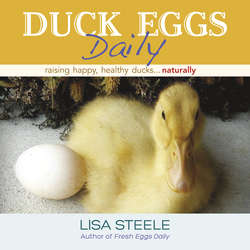Читать книгу Duck Eggs Daily - Lisa Steele - Страница 10
На сайте Литреса книга снята с продажи.
ADDING DUCKS TO A CHICKEN FLOCK
ОглавлениеDo you already raise chickens and are thinking about adding a few ducks to your flock? It’s as easy as, well, adding a few ducks. I’ve introduced ducklings (at least 8-10 weeks old so they’re big enough to not be trampled or drowned accidentally) and full-grown ducks to my mixed chicken and duck flock – which includes both a rooster and a drake, by the way – and never had any problems.
I think the chickens instinctively know that ducks are no threat to their pecking order. My chickens have never seemed concerned about sharing space with ducks. As for the ducks, they don’t adhere to nearly as strict a pecking order as do chickens, and they seem to view new ducks as more pool party participants; there’s always room for a few more!
But . . . Always separate new ducks for a few weeks to be sure they are not sick and won’t transmit anything to your existing flock, and to let them get used to their new home slowly; after that, you shouldn’t have any issues when you introduce them. And always watch for a while when you first add your ducks to be completely sure there won’t be any pecking or feather pulling or bullying. If you work during the week, first thing Saturday morning would be a good time to let your ducks get to know the chickens and vice-versa.
Ducks are very welcoming in general to newcomers. The exception could be a new drake introduced to a small flock with an existing drake, as some fighting over females could ensue, so always be sure to keep a close eye any time you add new flock members. Ducklings should never be added to a flock of grown ducks (unless accompanied by their mother duck to protect them) until they are nearly full grown, to prevent drowning or trampling accidents.
Sharing the coop. As for sleeping quarters, your ducks will be perfectly happy bunking in the chicken coop on the floor in the straw. They will even make a nest of their own in a corner in which to lay their eggs. Ducks really are low-maintenance, so if you’ve already got a coop with chickens in it, you don’t need to do a thing to accommodate a few ducks (but see page 75 for some differences to be aware of).
Feed and Treats. Our chickens and ducks eat the same feed and I give them the same treats. (For their particular preferences, see page 61.)
Feeders and waterers. You may need to rethink your feeders and waterers. (For the why and how, see pages 34 and 35.)
Adding a pool. You will also want to set up a pool area in a far corner of your run. A kiddie pool works well since it’s deep enough for the ducks to enjoy, but not so deep that a chicken will drown if she falls in. My chickens learned early on to avoid the mud around the pool area, but I do occasionally find a hen perched on the side of the pool.
Besides that, your chicken flock will greatly benefit from the addition of a few ducks, with very few changes made to your existing set-up.
Optimal Duck Flock Size
Single Duck – Not recommended, since they are social animals.
A Pair – Okay, but not optimal. If you lose one, the other will be inconsolable. Male/female pair can result in over-mating; two females is a better pair choice if two ducks is all you can have.
A Trio – One drake and 2 ducks can also lead to over-mating but is a good “starter” flock size and usually works well, as does 3 females.
Half Dozen – One drake and 4-5 ducks: my favorite flock size. Enough ducks to prevent over-mating; lots of eggs.
Larger flock – Multiple drakes with a minimum of 4-5 ducks per drake. If you keep multiple drakes, be sure you have enough ducks to give each his own mini-flock, although this can still lead to fighting or over-mating of a “favorite” female.
All Females (any number) – Can be noisy, but for egg production this is the optimal flock, although the eggs won’t be fertile.
All Drakes – Great if you want the ducks primarily as pets and don’t care about eggs. They are still great for bug control and hours of enjoyment. Also, since the drakes are very quiet, an “all boy” flock is good if you have close neighbors. Drakes generally won’t fight if there are no females present, and drakes are often easy to find for free at shelters, on Craigslist or at local farms.
